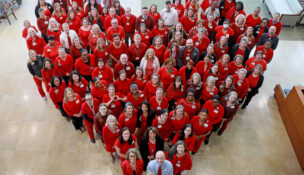Chapin-based startup offers remote monitoring for lung disease patients
Christina Lee Knauss //September 14, 2023//
Chapin-based startup offers remote monitoring for lung disease patients
Christina Lee Knauss //September 14, 2023//
Amanda Clark became a respiratory therapist after being impacted from personal loss due to chronic lung diseases including asthma and chronic obstructive pulmonary disorder, also known as COPD.
Years of work in the field gave Clark perspective on the needs of both patients and their health care providers, so she decided to start a business tailored to fulfilling those needs. The Chapin-based therapist turned entrepreneur has started three companies in recent years dedicated to helping people with chronic lung disease.
Her most recent startup PulManage, is a technology company that offers remote monitoring for patients with chronic lung disease, with a particular focus on COPD.
Clark told SC Biz News the idea for PulManage developed over her 20 years as a respiratory therapist, working with populations from pediatrics to adults.
“In asthma clinic, we would have some patients who produced normal test results but would blow through an entire albuterol inhaler (a common rescue medication used for asthma flares) in less than a month, and I remember trying to understand what was happening,” Clark said. “The need to monitor respiratory patients outside the office came out of frustrations and unknowns in my own practice.”
PulManage offers a mobile app that enables patients to monitor their symptoms and lung function measured through a Bluetooth spirometry device and transmits their real-time data to the medical team through a secure web-based portal to monitor their condition remotely.
The PulManage platform allows patients to report three types of information to their doctors from home. First, it keeps track of spirometry data. Basically, spirometry is a pulmonary function test that measures lung function and breathing patterns. In a session, patients also report vital signs including their temperature and respiratory rate in conjunction with symptoms they experience such as cough, shortness of breath and fatigue.
Remote monitoring is something that’s been available for years for some heart patients and those with other conditions like diabetes but is a new concept for those that suffer from COPD and other chronic lung diseases, Clark said.
Providing quick access to a patient’s respiratory symptom information serves a number of purposes: it not only gives a health care provider real-time perspective on how the patient is progressing, but also could offer new perspectives on medication effectiveness and provide opportunity for timely intervention.
“We’re pretty niche,” Clark said. “Respiratory care is different than any other specialty because diagnostic testing and medication delivery are dependent on patient effort. Medication is only going to deposit as deep in the lungs as a patient inhale with proper technique. Patients with more advanced lung disease require use of daily controller inhalers. However, many of them lack the inspiratory capacity to have the medication properly deposited in the airway. Likewise, diagnostic testing requires proper technique and coaching to generate accurate results. PulManage helps patients master this technique for effective remote surveillance which can be informative to the medical team making medication delivery selections.”
Patients being onboarded to the platform have the option to be seen at their doctor’s office or via a virtual meeting with a respiratory therapist.
In 2017, prior to dreaming up the idea for PulManage, Clark joined the University of South Carolina’s Technology Incubator in Columbia in 2017. This local resource provided a means for her to collaborate with talent that ultimately led to the development of the PulManage concept.
Since then, the company has become a supported member of SC Launch Inc., the investment vehicle of South Carolina Research Authority (SCRA). They have received several nondilutive grants including a $50,000 acceleration grant in 2021 and the company was named one of its Success Stories in 2022. Clark was featured as one of the keynote speakers at the Authority’s annual statewide summit in Columbia in April 2023.
PulManage’s technology is ever advancing, Clark said.
“Right now, we’re onboarding patients in South Carolina and Florida,” she said. “We are also in the throes of fundraising and plan to close this round soon. Funds raised from the round will be used to expand the platform and bring additional value to the medical community. Our impressive team has more than 60 years combined in pulmonary medicine, more than 50 years in tech development and more than 30 years in business development. Technology continues to advance at a rapid pace, so our work is evolving.”
Clark expects research and fine-tuning on the platform to go on for several more years, and looks forward to the day that her company moves the needle regarding the diagnosis and management of chronic lung diseases. Sadly, for many effected patients, diagnosis often comes after disease has advanced and the social stigmas are undeniable, Clark said. Surprisingly, COPD disproportionately affects women and roughly 25% of COPD patients have never been smokers. Additionally, 15% of people with the disease have a genetic component that makes them more susceptible.
The goal for PulManage, she said, is to help people with the disease manage their symptoms in a way that allows them to lead better, longer and fuller lives.
At-home monitoring, for instance, might help health care providers identify patterns that cause a worsening of symptoms, such as exposure to certain allergens, environmental toxins or even changes in temperature that can sometimes impact lung function.
“Currently, only 30% of COPD cases in the country have been confirmed with spirometry – the gold standard,” Clark said. “So, my team and I are interested in removing barriers for patients to receive appropriate care. Spirometry is often perceived as complicated, and it is not something every medical provider offers often due to lack of understanding or resources such as equipment or staffing. Utilizing technology like PulManage creates the potential to look at numbers and symptoms to determine if someone has a chronic lung disease much earlier. By understanding changes in symptoms, hopefully we can teach patients to recognize patterns early on and take a proactive approach to avoid exacerbations, ultimately preserving lung function.”
P















